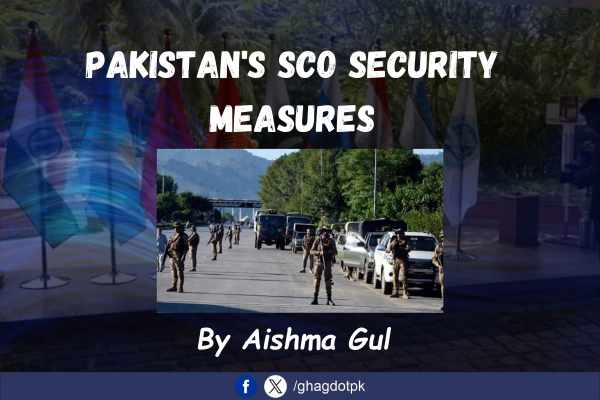By Aishma Gul
“Security is not just a priority but the foundation upon which the success of any diplomatic engagement rests.” This is especially true in light of the Shanghai Cooperation Organisation (SCO) summit, which will take place in Islamabad and for which high-level security arrangements will be crucial to its success. In addition to offering a chance for regional cooperation, the 2024 Shanghai Cooperation Organisation (SCO) summit in Islamabad, scheduled for October 15–16, also poses significant security challenges. It is crucial to ensure the safety of the heads of state and senior officials from the nine participating countries, which include China, Russia, India, and Iran. Pakistan’s security personnel are in charge of making sure the summit goes off without a hitch as the nation prepares to host this important event.
SCO’s Importance and Pakistan’s Role
Since its formation in 2001, the SCO has played an important role in regional stability and cooperation, particularly in combating transnational challenges such as terrorism and extremism. The organization aims to promote peace and security, hence security considerations must be prioritized. Pakistan, an essential component in regional geopolitics, has long been at the forefront of counterterrorism operations, so holding this conference is a significant milestone.
But the stakes are huge. Previous summits throughout the world have faced security concerns, serving as sharp reminders of the risks that such high-profile gatherings pose. For example, the 2008 attack in Kabul during an international conference shocked the diplomatic world, demonstrating how security flaws can have disastrous effects. Such occurrences highlight the importance of increased attention in securing international summits, particularly those held in risky locations.
Pakistan’s Multi-Layered Security Strategy
Pakistan has implemented extraordinary security measures to combat potential threats, deploying over 9,000 security personnel, including police, Rangers, and FC units. Furthermore, extensive digital surveillance tactics have been employed, with over 3,150 cameras monitoring key routes, venues, and access points around Islamabad. Notably, specific routes from the airport to the hotels and summit locations are being monitored in real-time by hundreds of cameras, and security pickets have been stationed at critical checkpoints to strengthen the event’s security layers.
To prevent any errors, Pakistan’s security personnel have launched search operations and intelligence-led raids in Islamabad. As an added precaution, three-day traffic restrictions have been imposed, prohibiting large vehicles from entering the city and momentarily suspending metro services to enable a smooth flow for the VVIP convoys.
Pakistan, with its history of combatting terrorism and extremism, is not taking any chances. The Safe City initiative has been relaunched to ensure 24-hour surveillance, and more anti-riot personnel, armed with tear gas and other crowd control equipment, are stationed at critical locations throughout the capital. Furthermore, diplomatic enclaves and the city’s Red Zone—the hub of administrative and diplomatic activity in Islamabad—are subject to severe security controls, with admission strictly limited.
Incidents at Past Summits
This level of security is critical considering the geopolitical threats that might accompany such high-level summits. Internationally, there have been various situations in which inadequate security has resulted in crises. For example, the 2005 Sharm el-Sheikh Summit in Egypt was bombed only days before it began, and the 2009 ASEAN Summit in Thailand had to be canceled due to anti-government protesters that broke through security barriers, endangering participating leaders. These tragedies demonstrate how important adequate security is to the success of such summits.
One of the most infamous incidents occurred during the African Union Summit in Libya in 2009, when a security failure resulted in an attack on dignitaries, causing widespread panic and injuries. Similarly, despite strict security precautions, violent demonstrations disrupted the 2017 G20 Summit in Hamburg.
These events underscore the importance of foolproof security in preventing both physical attacks and disruptions that could derail the summit’s proceedings. Lessons learned from such incidents have led to increased investment in preventive measures at international summits, and Pakistan is drawing from this global experience.
Importance of Security for the Summit’s Success
Security is a political, as well as a logistical, concern. A secure summit will demonstrate Pakistan’s growing ability to manage international events, ultimately improving its diplomatic status. On the contrary, any breach or attack may jeopardize the entire event, undermining both the host country and the SCO’s aim to promote regional peace and stability. Furthermore, the SCO summit will address topics such as counterterrorism, regional stability, and trade, all of which rely on a secure environment. Ensuring guests’ safety is critical, not only for the summit’s success but also for Pakistan’s reputation as a safe and secure country for international diplomatic relations.
The upcoming SCO summit in Islamabad has prompted Pakistan’s security apparatus to implement stringent measures to ensure a successful and secure event. With the deployment of thousands of security personnel, advanced surveillance systems, and the lockdown of key areas, the stakes are high. Past security failures at international summits underscore the importance of robust security measures. Pakistan’s commitment to regional peace and its growing global stature are reflected in its efforts to safeguard the summit. A successful, secure summit will enhance Pakistan’s diplomatic credibility and pave the way for deeper regional cooperation.
The success of the SCO summit in Islamabad hinges on the effectiveness of these security measures. Given the history of regional tensions and global examples of security breaches, Pakistan’s rigorous preparations aim to prevent any incidents and foster a peaceful environment for discussions on trade, security, and regional cooperation.






